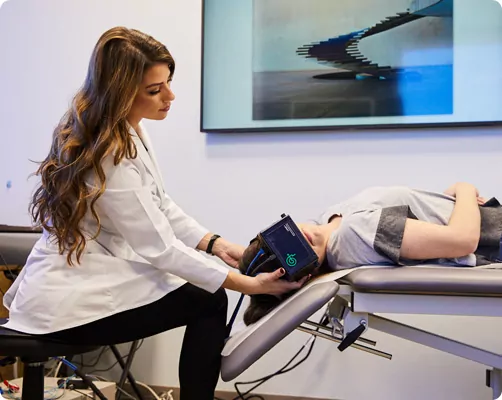Medication vs. Therapy: What's Best for Controlling Vertigo?
Medication vs. Therapy: What's Best for Controlling Vertigo?
Blog Article
Vertigo is a frequent issue that influences millions of people worldwide. It is indicated by way of a sensation of dizziness, rotating, or emotion off-balance. While vertigo may be brought on by different factors, distinguishing the main trigger is essential in determining the most effective therapy plan. In this blog post, we shall examine why it is vital to recognize the causes of vertigo efficient treatment and how it may improve your general quality of life.

Vertigo may be due to a few facets such as for example inner hearing problems, mind accidents, migraines, and also specific medications. Without knowing the root reason behind your vertigo symptoms, it can be tough to locate a proper therapy that will give long-term relief. For example, if your vertigo is caused by an inner head issue but you are prescribed treatment for headaches instead, you may not experience any improvement in your symptoms.
Pinpointing the reason for vertigo requires a thorough evaluation from a medical professional. This may contain bodily exams and diagnostic checks such as blood function and imaging tests to rule out any underlying situations or incidents that might be creating your symptoms. Once the trigger has been established, a customized therapy program can be developed to deal with your specific needs.
One reasons why determining the reason for vertigo is critical for powerful treatment is basically because different causes involve different methods in managing symptoms. For instance, if your vertigo is due to an inner hearing issue called benign paroxysmal positional vertigo (BPPV), unique workouts called canalith rethinking maneuvers will help alleviate symptoms. Nevertheless, these workouts wouldn't be beneficial if your vertigo was due to another thing like vestibular neuritis.
Furthermore, treating only the outward symptoms without addressing their cause can result in temporary aid although not long-term improvement in all around health and well-being. For instance, using medicine to alleviate vertigo signs caused by an inner head issue may provide short-term aid, but it does not handle the underlying issue. This will lead to repeating periods of vertigo and a decreased quality of life.
Pinpointing the cause of vertigo can also be important in blocking potential attacks and controlling any potential complications. Like, if your vertigo is the effect of a head injury, identifying it in the beginning may prevent more injury and enable appropriate treatment to be administered promptly.

Conclusion: To conclude, identifying the reason for your vertigo is essential for efficient treatment and over all well-being. It permits a customized method that handles the main cause relatively than just treating symptoms. With correct analysis and treatment, you can experience long-term respite from your indicators and boost your quality of life significantly. If you should be encountering regular episodes of vertigo or other connected signs, do not wait to find medical interest to determine the underlying trigger and receive ideal treatment.
________________________________________
Understanding the Area Effects of Frequent Vertigo Medications
===============================================
Vertigo is really a common condition that influences huge numbers of people worldwide. It is characterized by a experience of dizziness, rotating, and loss in balance. While there are various triggers for vertigo, it could be debilitating and considerably impact one's quality of life. Fortuitously, there are medicines accessible to greatly help reduce the outward symptoms and give relief for those suffering from vertigo. In that post, we will examine the different types of dizziness medication aid and why they work.

Probably the most generally recommended medicine for vertigo is named Meclizine (Antivert). This medication goes to a type known as antihistamines which function by preventing histamine receptors in mental performance accountable for causing dizziness and nausea. Meclizine has been found to work in lowering signs such as for instance dizziness, vomiting, and vomiting related to vertigo. It's frequently taken 1-4 times everyday with respect to the severity of symptoms.
A different type of treatment applied to deal with vertigo is named Benzodiazepines (Valium or Ativan). These drugs behave on specific neurotransmitters in the mind that regulate stability and coordination. They've been discovered to be effective in lowering thoughts of dizziness and nervousness connected with vertigo. Nevertheless, these drugs can cause drowsiness
as a side effect so they must be used with caution.
Sometimes where other drugs have not provided relief or if there are underlying conditions creating vertigo such as for instance Meniere's illness or vestibular migraines, health practitioners may prescribe diuretics like hydrochlorothiazide (HCTZ) or acetazolamide (Diamox). These drugs perform by reducing substance buildup in the internal hearing which could donate to periods of vertigo.
For those who knowledge serious bouts of vertigo that do not respond well to other drugs, health practitioners might prescribe steroids such as for instance prednisone. These drugs function by reducing infection in the inner ear that may cause vertigo. However, they're generally prescribed for short-term use as a result of potential part effects.
Along with these medicines, medical practioners can also suggest vestibular rehabilitation treatment (VRT) for long-term relief from vertigo symptoms. VRT is a form of physical treatment that centers around workouts and methods to enhance balance and reduce dizziness. It has been found to be effective in controlling vertigo indicators and improving overall quality of life.

Realization: While there is no one-size-fits-all strategy when it comes to treating vertigo, medicines can offer substantial relief for those experiencing this condition. Meclizine, Benzodiazepines, diuretics, steroids, and VRT are generally recommended options which were found to be effective in managing vertigo symptoms. It is important to consult with a doctor before starting any medicine program as they are able to establish the very best length of therapy centered on personal needs and medical history. Report this page